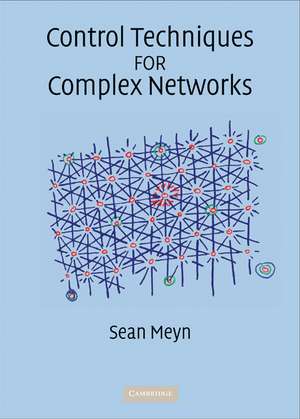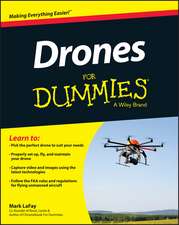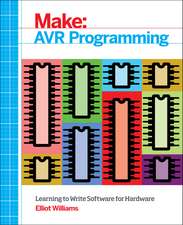Control Techniques for Complex Networks
Autor Sean Meynen Limba Engleză Hardback – 9 dec 2007
Preț: 708.06 lei
Preț vechi: 795.57 lei
-11% Nou
Puncte Express: 1062
Preț estimativ în valută:
135.48€ • 141.46$ • 112.13£
135.48€ • 141.46$ • 112.13£
Carte tipărită la comandă
Livrare economică 05-19 aprilie
Preluare comenzi: 021 569.72.76
Specificații
ISBN-13: 9780521884419
ISBN-10: 0521884411
Pagini: 582
Ilustrații: 98 exercises
Dimensiuni: 183 x 260 x 33 mm
Greutate: 1.18 kg
Editura: Cambridge University Press
Colecția Cambridge University Press
Locul publicării:Cambridge, United Kingdom
ISBN-10: 0521884411
Pagini: 582
Ilustrații: 98 exercises
Dimensiuni: 183 x 260 x 33 mm
Greutate: 1.18 kg
Editura: Cambridge University Press
Colecția Cambridge University Press
Locul publicării:Cambridge, United Kingdom
Cuprins
Preface; 1. Introduction; Part I. Modeling and Control: 2. Examples; 3. The single-server queue; 4. Scheduling; Part II. Workload: 5. Workload and scheduling; 6. Routing and resource pooling; 7. Demand; Part III. Stability and Performance: 8. Foster-Lyapunov techniques; 9. Optimization; 10. ODE methods; 11. Simulation and learning; Appendix. Markov models; References; Index.
Recenzii
'Sean Meyn's text is a wonderful piece of work … It progresses through a series of important topics, running the gamut from modern control techniques for queuing system analysis, to optimization of deterministic network models, to computer simulation methods; and all the while, it provides rigorous mathematical foundations alongside a variety of clever, practical applications. The lively writing style and apt examples keep everything interesting, and I believe that readers will greatly appreciate and benefit from this unique book.' David M. Goldsman, Georgia Institute of Technology
'Sean Meyn's earlier book with Tweedie is the bible for economists who use Markov models to do everything from formulating asset pricing models to constructing Bayesian posteriors for dynamic models. This book is a gold mine of useful new ideas. I predict that the ideas in chapter 11 alone will have a big impact on the way we think about computing rational expectations equilibria.' Thomas Sargent, New York University; Winner of the 2011 Nobel Prize in Economic Sciences
'The first comprehensive account of some major strands of research in modeling, approximation, stability analysis and optimization of stochastic networks, from a leader in the field … Notable among these are its coverage of deterministic fluid limits, controlled random walk models, approximation via workload relaxation, and implications of these to stability and optimization of networks. Several important special instances are worked out in detail. A valuable resource for both researchers and practitioners.' Vivek S. Borkar, Tata Institute of Fundamental Research
'In my opinion this book is written primarily for seasoned researchers in the field who need a nice source of existing results and ideas. In this vein the book is outstanding and it should become an indispensable aid to researchers and practitioners. … All in all this is an excellent book …' Mathematical Reviews
'Sean Meyn's earlier book with Tweedie is the bible for economists who use Markov models to do everything from formulating asset pricing models to constructing Bayesian posteriors for dynamic models. This book is a gold mine of useful new ideas. I predict that the ideas in chapter 11 alone will have a big impact on the way we think about computing rational expectations equilibria.' Thomas Sargent, New York University; Winner of the 2011 Nobel Prize in Economic Sciences
'The first comprehensive account of some major strands of research in modeling, approximation, stability analysis and optimization of stochastic networks, from a leader in the field … Notable among these are its coverage of deterministic fluid limits, controlled random walk models, approximation via workload relaxation, and implications of these to stability and optimization of networks. Several important special instances are worked out in detail. A valuable resource for both researchers and practitioners.' Vivek S. Borkar, Tata Institute of Fundamental Research
'In my opinion this book is written primarily for seasoned researchers in the field who need a nice source of existing results and ideas. In this vein the book is outstanding and it should become an indispensable aid to researchers and practitioners. … All in all this is an excellent book …' Mathematical Reviews
Descriere
From foundations to state-of-the-art; the tools and philosophy you need to build network models.













